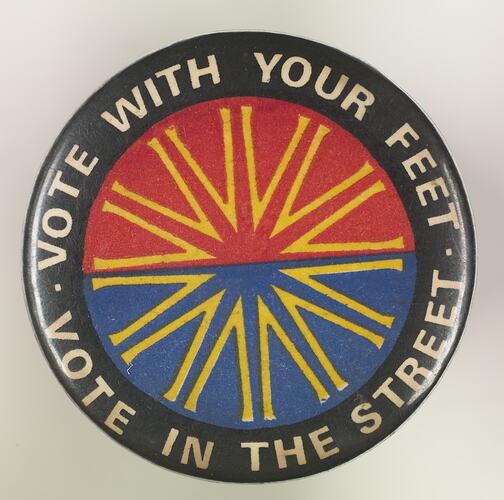Alice Olive was born in born in Kew, Melbourne on 19 March 1929. She studied psychology as part of an arts degree at Melbourne University, where she joined the local branch of the Communist Party of Australia. She later learned that her involvement with the party gained the attention of ASIO.
She was married for a brief time while at university. In 1949 she moved to Yallourn to live with her new partner, unionist John Zakharov. The couple then married and began a family. Olive spent many years juggling family commitments with several jobs including market research interviewer, clerk, waitress, mail officer, psychiatric nurse and pathology assistant, while maintaining an active contribution to her local branch of the Australian Labor Party (ALP).
In 1968, after the last of her children had reached primary school, Zakharov separated from her husband, and later divorced him. In 1969 she became student welfare co-ordinator at Melbourne's Montmorency Secondary College. During this time she served as president of her local ALP branch and was a delegate to the party's state conference. During the 1970s she was offered a safe Labor seat in the Parliament of Victoria, but declined due to family commitments.
In 1983 Olive was elected to the Senate of the Parliament of Australia as a representative for Victoria. She soon established herself as a loyal member of the Socialist Left faction of the ALP and as an advocate for equal rights for women and the rights of the disadvantaged. This early advocacy for progressive causes saw her awarded the second ever Australian Humanist of the Year award in 1984. She was re-elected to the Senate in 1984, 1987, and 1993. In 1988 she was the only Western politician invited to witness the first destruction of nuclear weapons at a ceremony in the Soviet Union after the signing of a disarmament agreement.
In November 1993, Zakharov revealed that she had been a victim of domestic violence at the hands of her husband, John Zakharov, for ten years prior to their separation. She launched the government's Campaign to Stop Violence Against Women, and urged other victims and their neighbours to speak up. She said at the time that she had kept silent because 'There were no alternatives. There were no refuges for women, no supporting parent's benefit and almost no child care. I made the break when my youngest was old enough to go to school so I could work.'
Olive was struck by a car on 12 February 1995, while crossing St Kilda road after leaving the Midsumma festival. She lay in a coma for more than a month, but did not regain consciousness and passed away on 19 March.
Upon her death, the Senate adjourned early and several red roses, the symbol of the international socialist movement, were placed upon her desk as a mark of respect. More than two hours of condolence speeches were delivered in parliament, and after her funeral on 30 March a memorial plaque was unveiled in the courtyard at Parliament House.
Deputy Prime Minister Brian Howe attempted to convince the Victorian State Government to save the historic Missions to Seamen building in Port Melbourne, which Zakharov had been fighting to save, as a memorial to her, but the request was unsuccessful. In March 2002 a memorial to Olive was unveiled in a park in Bay Street, Port Melbourne.
References
'Biography for ZAKHAROV, Alice Olive', 2008, Biographies, Australian Parliamentary Library, ParlInfo, viewed 21 November 2011, http://parlinfo.aph.gov.au/parlInfo/search/display/display.w3p;query=(Id:handbook/allmps/fe4);rec=0
More Information
-
Keywords
Communism, Politicians, Political Parties, Politics, Women's Issues, Gay and Lesbian, Domestic Violence, Anti-Nuclear Protests, Nuclear Disarmament, Vietnam Moratorium, Vietnam War, 1959-1975, Public Protests, Political Protests
-
Authors
-
Article types
